中考英语复习课本知识整理八年级上
- 格式:docx
- 大小:106.19 KB
- 文档页数:16
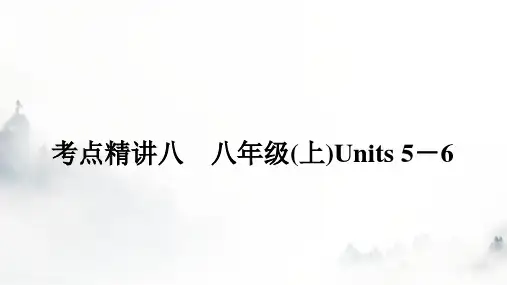
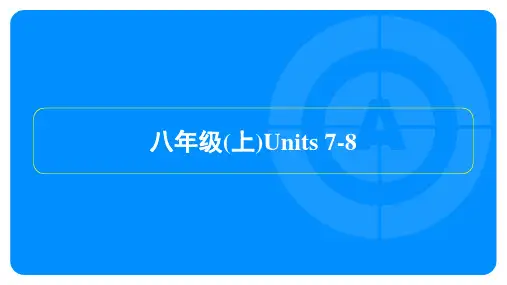
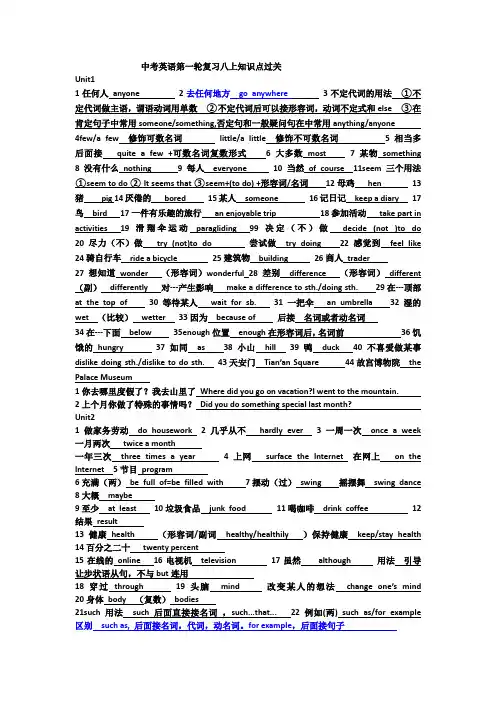
中考英语第一轮复习八上知识点过关Unit11任何人anyone 2去任何地方go anywhere 3不定代词的用法①不定代词做主语,谓语动词用单数②不定代词后可以接形容词,动词不定式和else ③在肯定句子中常用someone/something,否定句和一般疑问句在中常用anything/anyone4few/a few 修饰可数名词little/a little 修饰不可数名词5相当多后面接quite a few +可数名词复数形式6大多数most 7某物something 8没有什么nothing 9每人everyone 10当然of course 11seem三个用法①seem to do ② It seems that ③seem+(to do) +形容词/名词12母鸡hen 13猪pig 14厌倦的bored 15某人someone 16记日记keep a diary 17鸟bird 17一件有乐趣的旅行an enjoyable trip 18参加活动take part in activities 19滑翔伞运动paragliding 99决定(不)做decide (not )to do 20尽力(不)做try (not)to do 尝试做try doing 22感觉到feel like 24骑自行车ride a bicycle 25建筑物building 26商人trader27想知道wonder (形容词)wonderful 28差别difference (形容词)different (副)differently 对---产生影响make a difference to sth./doing sth. 29在---顶部at the top of 30等待某人wait for sb. 31一把伞an umbrella 32湿的wet (比较)wetter 33因为because of 后接名词或者动名词34在---下面below 35enough位置enough在形容词后,名词前36饥饿的hungry 37如同as 38小山hill 39鸭duck 40不喜爱做某事dislike doing sth./dislike to do sth. 43天安门Tian’an Square 44故宫博物院the Palace Museum1你去哪里度假了?我去山里了Where did you go on vacation?I went to the mountain.2上个月你做了特殊的事情吗?Did you do something special last month?Unit21做家务劳动do housework 2几乎从不hardly ever 3一周一次once a week 一月两次twice a month一年三次three times a year 4上网surface the Internet 在网上on the Internet 5节目program6充满(两)be full of=be filled with 7摆动(过)swing 摇摆舞swing dance 8大概maybe9至少at least 10垃圾食品junk food 11喝咖啡drink coffee 12结果result13健康health (形容词/副词healthy/healthily )保持健康keep/stay health 14百分之二十twenty percent15在线的online 16电视机television 17虽然although 用法引导让步状语从句,不与but连用18穿过through 19头脑mind 改变某人的想法change one’s mind 20身体body (复数)bodies21such用法such 后面直接接名词,such...that... 22例如(两) such as/for example 区别such as, 后面接名词,代词,动名词。
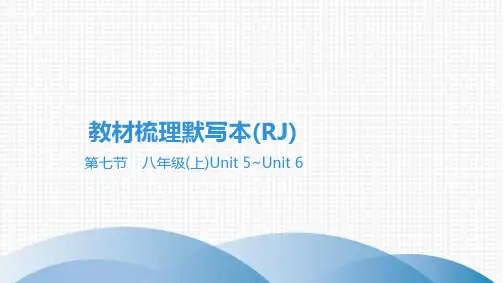
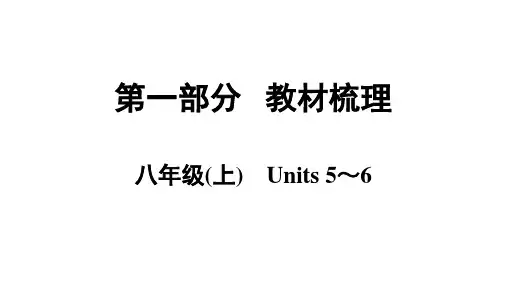
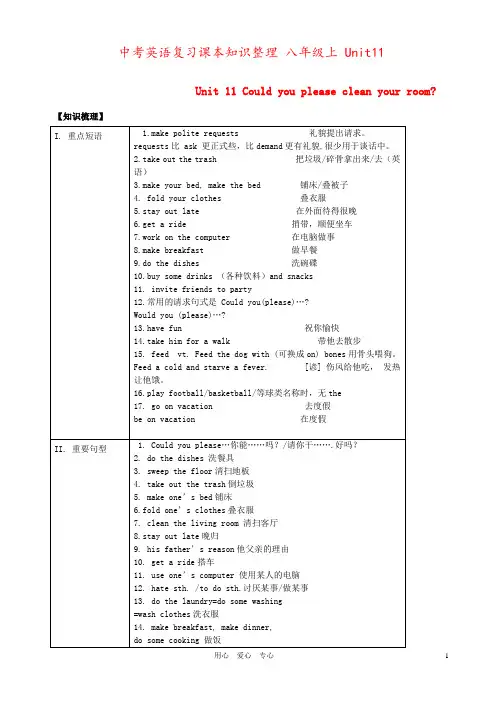
中考英语复习课本知识整理八年级上 Unit11Unit 11 Could you please clean your room?【知识梳理】【课文解析】take out意为“取出,拿出”,out为副词,因此当其宾语为名词时,可置于两词中间或两词后,但若是人称代词,则只能放在两词中间。
Your pen is in my pencil-case.You can take it out.你的钢笔在我的铅笔盒里,你可以把它拿出来。
do the dishes相当于wash the dishes,意为“洗餐具”。
其中do偏重于“行为”,指“做、干”:其中dish本来指一道菜,此处引申为“餐具”。
Her job is to do the dishes.她的工作是洗盘子。
sweep用作动词,意为“打扫”,其过去式为swept。
floor用作名词,意为“地板”,指室内的地面,也可指楼房的“层”。
She swept the floor after supper.晚饭后她清扫了地板。
make one's bed相当于make the bed,但go to bed(上床睡觉)中不用冠词。
Don't forget to make your bed.别忘了整理你的床铺。
I hate dogs.我讨厌狗。
I enjoy cooking but hate washing dishes.我喜欢做饭,但是不喜欢洗盘子。
I like swimming but I hate to swim today.我喜欢游泳,但今天我讨厌游泳。
agree可用于简短问答中,表示“同意”或“赞成”。
一The football match is quite exciting.Do you agree?这场足球赛很刺激,你认为呢?一Yes,I agree./No,I don't really agree.是的,我觉得是。
/不,我不完全同意。

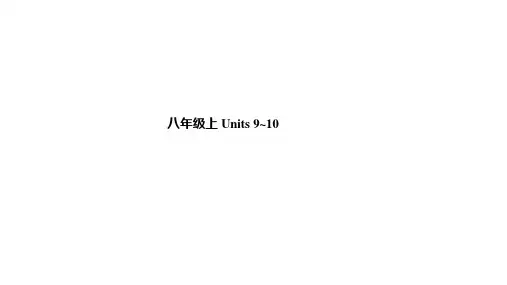
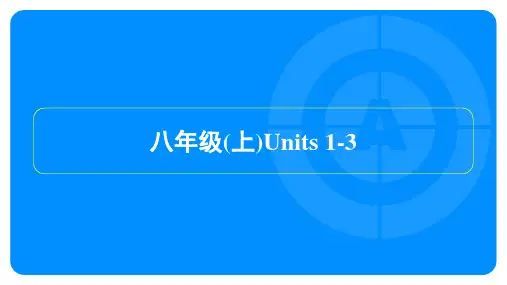

初二年级(上)【知识梳理】I. 重点短语1. on time2. best wishes3. give a talk4. for example5. short for6. a waste of time7. go on a field trip8. go fishing9. I agree10. next week11. the day after tomorrow12. have a picnic13. have some problems doing sth.14. go the wrong way15. hurry up16. get together17. in the open air18. on Mid-Autumn Day19. come over20. have to21. get home22. agree with23. in the country24. in town25. all the same26. in front of27. on the left/right side28. next to29. up and down30. keep healthy31. grow up32. at the same time33. the day before yesterday35. last Saturday36. half an hour ago37. a moment ago38. just now39. by the way40. all the time41. at firstII. 重要句型1. have fun doing sth.2. Why don’t you…?3. We’re going to do sth.4. start with sth.5. Why not…?6. Are you going to…?7. be friendly to sb.8. You’d better do sth.9. ask sb. for sth.10. say goodbye to sb.11. Good luck(with sb)!III. 交际用语1.Welcome backto school!2.Excuse me. I’m sorry I’m late, because the traffic is bad.3.It doesn’t matter.4.Happy Teachers’ Day !5.That’s a good idea.6.What are you going to do?7.Where are we going ?8.What are we going to do ?9.I’m good at…10.It’s not far from…11. Are you free tomorrow evening?12.Would you and Lily like to come over to my home for Mid-Autumn Festival?13.I’m glad you can come.14.Thanks for asking us.15.How about another one?16.May I have a taste?17.Let me walk with you.18.What do you have to do?19.Do you live on a farm?20.Which do you like better, the city or the country?21.Which do you like best, dogs, cats or chickens?22.Shall we go at ten? Good idea!23.---Let’s make it half past one. ---OK.24.---Why not come a little earlier? ---All right.25.Excuse me. Where’s the nearest post office, please?26.It’s over there on the right.27.I’m sorry I don’t know.28.You’d better…29.Thank you all the same.30.Which bus do I take?31.Go along this road.32.What day was it yesterday?33.I’m sorry to hear that.34.I hope you’re better now.35.Why did you call me?36.I called to tell…IV. 重要语法1.be going to的用法;2.形容词的比较级、最高级;3.形容词和副词的比较4.一般过去时【名师讲解】1. on the street / in the street表示“在街上”时,on the street和in the street 都可以,在美国多用on the street, 在英国多用in the street. 例如:We have a house in the street. 我们在街上有座房子。

中考英语总复习资料第5讲八年级英语上册Units3--4一、重点词汇1.good(adv.)→(比较级)→(最高级)2.loudly(adv.)→(adj.)响亮的;大声的3.competition(n.)→(v.)竞争4.win(v.)→(过去式)→(n.)获胜者5.true(adj.)→(adv.)真正;确实→(n.)事实;真相6.serious(adj.)→(adj.反义词)易相处的7.comfortable(adj.)→(反义词)不舒适的8.close(v.)→(adj.)近的→(adj.)关着的9.bad/badly→(比较级)→(最高级)10.cheaply(adv.)→(adj.)便宜的→(反义词)贵的11.choose(v.)→(n.)选择12.carefully(adv.)→(adj.)谨慎的→(反义词)粗心的→(n.)关心13.poor(adj.)→(反义词)富有的二、重点短语1.关心2.只要;既然3.与……不同4.使显现5.和……相同6.事实上7.与……相像的8.取得更好的成绩9.到目前为止10.有相同特征11.各种各样的12.是……的职责;由……决定13.发挥作用14.编造15.例如16.认真对待三、重点句型1.汤姆比萨姆更聪明吗?Is Tom Sam?2.萨姆和汤姆都会敲鼓,但是萨姆比汤姆敲得好。
Sam Tom can play the drums,but Sam plays them Tom.3.你和你姐姐一样友好吗?Are you your sister?4.在学校谁更努力?蒂娜认为她比我学习更努力。
—Who is hardworking at school?—Tina thinks she works me.5.它有最大的屏幕。
It has screens.6.才艺展示越来越受欢迎。
Talent shows are getting .7.人们看这样的节目时,通常承担着评判胜者的角色。
课时08.八年级上册Units 4~6【答案】一.重点单词1.theater 2.seat 3.screen 4.ticket 5.song6.fresh7.service8.pretty9.menu 10.meal11.magician12.role13.prize14.everybody15.example16.news17.mind 18.plan19.happen20.expect21.joke22.cartoon23.might24.main25.reason mon27.ready28.army29.doctor30.engineer31.pilot32.college33.medicine 34.university35.London36.article37.team38.foreign39.promise40.physical41.hobby 42.schoolwork43.paint44.question45.relationship二.词形百变1.uncomfortable 2.closer closest 3.worse worst4.cheaply 5.chose chosen choosing 6.carefully7.reporter8.actor actress action activity activities9.creative10.talented 11.beautifully beauty12.poorer poorest rich/wealthy13.seriously14.gave given giving 15.stood16.education educational17.hopeful hopeless18.discussion19.meaningful meaningless 20.cultural21.wellknown22.appearance disappear23.became become becoming24.succeed successful successfully25.lost losing26.simply27.drove driven driving driver28.sent29.began begun beginning30.improved improving improvement 31.owner32.personal三.核心短语1.close to 2.so far 3.have... in common4.all kinds of 5.be up to 6.play a role7.make up8.for example9.take... seriously10.find out11.be ready to12.dress up13.take sb.'s place14.do a good job15.grow up16.be sure about17.make sure18.be able to19.at the beginning of20.write down21.have to do with22.take up23.agree with四.核心句型1.the best the closest to 2.the worst3.think of mind 4.What do 5.going to6.to be to be7.How going I'm going to高频考点突破考点1Call the English Study Center at 443-5667 for more information.拨打443-5667到英语学习中心获取更多信息。
一、单词默写。
1.新闻2.介意3.忍受4.有教育意义的5.计划6.希望7.讨论8.发生9.期待10.笑话11.无意义的12.行动,动作13.卡通片14.文化15.出名的16.出现17.变成18.富有的19.成功的20.可能;也许21.主演的22.原因;理由23.普遍的;公共的24.电影25.不幸的26.丢失27.准备好的28.简单的29.敌人30.做饭;厨师31.医生32.工程师33.小提琴家34.司机35.飞行员36.钢琴家37.科学家38.大学;学院39.大学40.教育41.药42.文章;论文43.送;寄送44.团队45.外国的46.能够47.承诺48.开始;开端49.提高;改善50.身体的,物理的51.他们自己52.爱好53.画画,涂漆54.每周的(地)55.学业56.问题57.意义58.讨论(v.)59.自己的;拥有60.个人的61.关系;联系二、重点短语。
1.一则新闻2.介意做某事3.无法忍受做某事4.计划做某事5.希望做某事6.期待做某事7.和某人讨论某事8.找出,查明9.某事发生在某人身上10.碰巧做…11.开某人的玩笑12.动作片13.因…而出名14.作为…而出名15.在…很富有16.做某事很成功17.主要思想18….的理由19.普遍20.准备好做某事21.打扮成22.代替某人23.干得好24.长大25.对…有把握26.计算机程序员27.确保28.去上大学29.吃药30.送某物给某人31.成为足球队的一员32.能够做某事33.承诺做某事34.做出承诺35.在…的开始36.写下37.与…有关38.学着/开始做某事39.回答问题。
八年级(上) Units 3-4教材梳理教材基础知识梳理教材重难点讲解both adj.& pron.两个;两个都(教材八上P17)【辨析】(1)both 与allboth 与all 均有“都”的意思。
可作主语,也可作定语修饰名词的复数形式。
但both 表示“两者都”,其反义词是neither ;而all 表示“三者或三者以上都”,其反义词是none 。
如:The two dogs are both barking.这两只狗都在叫。
The five boys are all playing basketball.这五个男孩都在打篮球。
(2)both …and …,either …or …与neither …nor …选择填空。
(C)1.(文化信息题)The Sun Yat-sen Mausoleum(中山陵) is not far from Xuanwu Lake(玄武湖).You can visit ________ in a day.A.each B.none C.both D.neither(C)2.(2018云南蒙自二模)—Were your brother and sister at home yesterday,Victor?—No,we ________ went to the park for a picnic.A.both B.neitherC.all D.none(D)3.(2018桂平二模)—Have you watched the latest TV program Running Man(《奔跑吧,兄弟》)?—Of course! It's popular with ________ the young ________ the old.A.either;or B.not;butC.neither;nor D.both;and(D)4.(2018黔南中考)______ my friends ______ I like playing computer games because we think it wastes time.A.Both;and B.Not only;but alsoC.Either;or D.Neither;norwin v.获胜;赢;赢得(教材八上P18)【辨析】win与beatWe won the game at last.我们最终赢得了比赛。
八年级上册Unit 1---2知识点总结词汇:1.decide v.决定;选定(n. decision)(1)decide to do sth. 决定做某事(2)make decides/a decision 做决定,下决心◆T hey decided to go hiking on the weekend.◆H e made a decision to give up smoking.2.try v.&n.尝试;设法;努力(1)try sth. 尝试某物(2)try to do sth. 努力做某事(强调付出一定的努力去完成某事)(3)try one’s best to do sth. 尽全力做某事(4)try doing sth. 尝试做某事(不一定付出很大的努力)◆L et me have a try.◆C hildren always want to try new things.◆T hey tried to finish the task on time.◆B ill tried his best to pass the math exam.◆A nn tries eating carrots.3.enough adj.&adv.足够的(地);充足的(地);充分的(地)enough可与形容词、副词和名词连用。
一般情况下,形容词和副词放在enough之前,名词放在enough之后。
◆I’m afraid that we don’t have enough food.◆W e didn’t get up early enough.◆H e is strong enough to carry these heavy boxes.4.hardly adv. 几乎不,几乎没有hard adj.坚固的,硬的;困难的;猛烈的;努力的adv.努力地;猛烈地;沉重地◆I can hardly believe him.◆I t’s hard for us to work out the problem.◆T he truth is that if we don’t work hard, we will lose the match.〖注意〗很多学生认为hardly是hard的副词形式,但其实它们之间并无关系。
2010中考英语复习课本知识整理八年级上Unit 8 How was your school trip?【知识梳理】I. 重点短语 1. talk about 谈论,talk over 谈论2. give a talk 作报告3. have a talk to (with) sb. 与某人谈话4. go to the beach 去海滩5.have ice cream 吃冰淇淋6.go to the zoo 去动物园7.go to the aquarium 去水族馆8. hang out with one’s friends 和朋友闲逛9. take photos=take a photo =take pictures=take a picture 照相10. buy a souvenir 买纪念品11. have pizza 吃比萨饼12. a famous actor 著名的演员13.get one’s autograph 得到了某人的亲笔签名14. win a prize 赢得奖品(奖项)15. at the aquarium 在水族馆16.have a great time 玩得高兴,过得愉快17.on the school trip 在学校的旅游18.Blue Water Aquarium 蓝色水族馆19.the Visitors’ Center 游客中心20.a dolphin show 海豚表演21.after that 后来22.at the end of…在……结束的时候,在……的尽头23.the Gift Shop 礼品店24. at the beginning of…在……开始的时候25. a terrible school trip 糟糕的学校旅行26. that sounds interesting 那听起来很有趣27.make up a story 编一个故事28. go for a drive 开车兜风30.in the rain 在雨中,in the dark 在黑暗中,in the sun 在阳光下,in the snow 在雪中31. take notes of=write down=copy down 写下,记下32. have fun doing sth. 很快乐的做某事33. play computer games 打电脑游戏34.for sale 供销售35.see you soon 盼望很快见到你36.in one’s opinion 据某人看来,某人的观点上看37. win the first prize 获得了一等奖38.a famous basketball player 著名的篮球运动员39. in the future在将来,今后40. can’t help doing sth. 忍不住做某事41.the story goes that…据说……42. a busy day off 繁忙的假日,in one’s off hours 在某人的休息时间,the off season 淡季43. none of………当中没有一个44. a heavy rain 一阵大雨,a light rain 一阵小雨, a fine rain 一阵细雨44. all day=all day long 整天,all night=all night long 整夜II. 重要句型 1.get one’s autograph 得到某人的签名2. day off 休息日on my next day offhave + 时间+ off 休息多久3.beat sb 打败(某人、某队)they beat us in the soccer match.win 赢得(比赛,奖项)4. How was your school trip? 你的学校旅游怎样?5. What did you do last Sunday? 上周星期天你做了些什么?6.①.There is(was)+可数名词单数(不可数名词)+somewhere.②There are(were)+可数名词复数+somewhere 某处有…7. How was the weather yesterday? 昨天天气如何?8. Did you clean the classroom yesterday? 你昨天打扫了教室了吗?9. Were there any sharks? 有鲨鱼吗?10.what else…别的什么。
else “别的,其他的”,位于疑问代词或不定代词后11. at the end of…在。
末尾(可用于时间,也可用于地方)12. have fun doing sth. 做某事很有趣III. 交际用语询问和谈论过去发生的事情IV. 重要语法一般过去时【课文解析】1.event n.事件,大事;比赛项目,竞赛I hope that one day surfing will be all event of the Olympic Games.我希望有一天冲浪成为奥林匹克运动会的一个比赛项目。
2.Did you go to the zoo?(1)Did you……你干……了吗?用于询问别人在过去某一时间是否做了某事。
一Did you visit Mr Wang last Sunday?上星期天你们去探望王先生了吗?--Yes,we did.是的,我们去了。
词的区别在于:some一般用于肯定句中.any一般用于疑问句、否定句和条件句中。
I have some friends at schoo1.我在学校里交了一些朋友。
Do you have any friends at schoo1?你在学校里有朋友吗?I don’t have any friends at schoo1.我在学校里没有任何朋友。
I’d like some tea,please.我想喝点儿茶。
Do you want any ink?你想要些墨水吗?I don't eat any bread at breakfast.早餐时,我一点儿面包都不吃。
4.hung out with her friends与她的朋友闲逛hang out表示“出去闲逛”,相当于hang about/around。
He is always hanging out/about/around in the street.他总是在街上闲逛。
(1)hang通常作为“悬挂”解,是不规则动词,过去式和过去分词形式均为hung。
She hung the washing out in the garden.她把洗的衣服晾在花园里。
(2)hang作“吊死,绞死”解时,是规则动词,过去式和过去分词均为hanged。
The man hanged himself last night because he was in heavy debts。
由于负债累累,那个人昨天晚上上吊自杀了。
5.bought a souvenir买一件纪念品buy意为“买”,其过去式和过去分词均为bought。
buy与sell(1)buy意为“买”,它的反义词是sell,意为“卖”。
buy可以用于buy sth.for sb.或buy sb.sth.这两个结构中,意为“给某人买某物”。
buy sth.from...意为“从……买某物”。
My mother is going to buy me a new coat.=My mother is going to buy a new coat for me.我妈妈准备给我买一件新上衣。
I'm going to buy one book from the old man.我打算从这位老人那里买一本书。
(2)sell意为“卖”,可以用于sell sth.to sb.或sell sb.sth.这两个结构中,意为“把某物卖给某人”。
Mr Smith is going to sell his car to me.=Mr Smith is going to sell me his car.史密斯先生准备把他的车卖给我。
(3)buy和sell可以与介词for连用,for后面接价格或消费数额,表示买东西花了多少钱或卖东西得了多少钱。
He sold his old house for 200 thousand yuan.他把他的旧房子卖了20万元。
(4)buy和sell还可用作不及物动词。
It's free to buy here and sell here.这里买卖自由。
6.What else did you do?你还干别的什么了?Where else can he go?他还能去别的什么地方呢?I don't want anything else,thanks.我不要别的东西了,谢谢。
【易混辨析】other与else两者都有“其他的,另外的”这一含义,但用法不同。
(1)else为副词,常用于修饰不定代词、疑问代词或副词,也可以修饰au,much,little等词,修饰这些词时,else要位于其后,作后置定语。
Why didn't you come? Everyone else was there.你为什么没来呢?其他所有的人都来了。
I'm taking a few clothes and some books,not much else.我带几件衣服和一些书,别的就不带了。
(2)else还可以构成名词所有格,即else's,意为“另外的,其他的”。
That,must be someone else's umbrella.not my sister's.那一定是其他人的雨伞,不是我姐姐的。
(3)other作为形容词,用以修饰名词,位于其前作定语。
We learn Chinese,math,English and some other subjects at schoo1.我们在学校学习语文,数学,英语,还有一些别的科目。
(4)other作代词,复数形式为others。
Some students are playing under the tree.Others are flying kites overthere.一些学生在树下玩,还有一些在那边放风筝。
7.Toby won a prize.托比获奖了。
won为动词win的过去式,此句中的win为及物动词,意为“赢得,获得(某一项奖品或奖项、奖金等)”。
She won first prize in the speech contest.在演讲比赛中她得了一等奖。